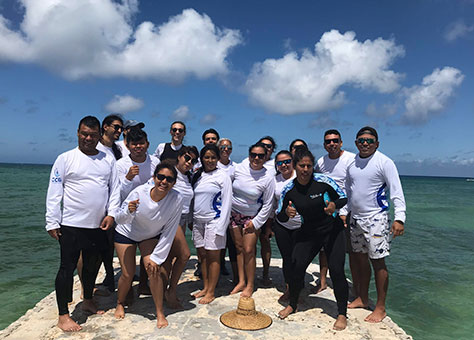COBI strategy 2020-2025
The current and next generation of people engaged in fishery use and share their knowledge to design and implement solutions for the existence of resilient coastal communities and healthy oceans.
To achieve this goal we will implement three strategies. The co-creating of solutions (innovate) to adapt to environmental and social changes between women and men of fishery and COBI; which will be validated and replicated through a network of fishers (connect). Finally, mechanisms will be developed to promote the expansion of solutions so that the following generations of fishers implement and improve them.
Likewise, we will work with three transversal strategies, gender equality, effective coordination between the parties involved, and environmental and social justice.
Innovate
300,000 fishers (men and women) share knowledge to co-create solutions.
Connect
A network that incubates and accelerates financially sustainable solutions.
Scale
Mexican fishers (men and women) inspire others in Latin America to use and develop solutions. Future generations are better informed and participate in the work to achieve resilient communities and healthy oceans.
-
Gender equality in fisheries management decision-making.
-
Effective coordination, appropriate policies and citizen science support the resilience of coastal communities.
-
Environmental and social justice.
- Healthy ecosystems and productive fishing.
- Resilient coastal communities adapt to environmental and social challenges.
- Environmental and social justice is achieved through a human rights-based approach.
UNDERSTANDING THE PROBLEM
Theory of change
Every day short-term changes, such as financial crises, and global changes such as climate change, are diluting the results obtained through traditional strategies of protection and sustainable use of marine resources.
Just as these changes are increasing and creating new environmental and social challenges, coastal communities are particularly vulnerable to these changes. However, people who are engaged in fishery will continue to fish daily, making decisions based on their beliefs and the information and knowledge available to adapt.
Some of their choices move them towards sustainability and the common good, and others push them away. Fisherwomen and men are decisive, they change from one fishery to another in a matter of days, create new fishing techniques and find new markets quickly. In addition, coastal communities are becoming less isolated every day, adopting new communication tools, such as social networks, mobile technologies and other innovations to share information and make decisions.
The way in which coastal communities are rapidly adapting to current changes is through the combination of their assets, social organizations, learning, flexibility and management.

For over two decades, COBI in collaboration with women and men of 34 fishing communities in Mexico, have co-created demonstrative models to restore marine ecosystems and fishery. We have developed these models based on the questions that coastal communities have regarding the conservation and management of marine resources, and through the scientific method, they are answered with fisherwomen and men, producing robust citizen science.
The process is summarized in listening-designing-developing-implementing-learning with the communities, making sure that the technical and financial resources are in place. The learning is systematized, and its replication in other communities is encouraged through exchanges between peers. Finally, these models are used to inform public policies, ensuring that the legal framework supports participation and sustainability.
However, COBI is a single fish in the sea, and due to accumulated global impacts and slow policy implementation processes, it is necessary to go beyond demonstrative models to scalable solutions that create resilience in the 2 million mexican households that depend directly and indirectly on fishery. So our goal for 2025 is that current and future generations of fishers use and share their knowledge to co-design and implement solutions that achieve resilient communities and healthy oceans.
Help us protect the marine ecosystems
We carry out our work thanks to donations from foundations and people like you.


